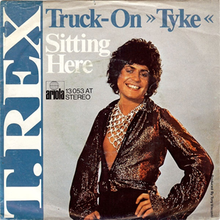
Marc Bolan was an English guitarist, singer-songwriter and poet. He was a pioneer of the glam rock movement in the early 1970s with his band T. Rex. Bolan strongly influenced artists of many genres, including glam rock, punk, post-punk, new wave, indie rock, Britpop and alternative rock. He was posthumously inducted into the Rock and Roll Hall of Fame in 2020 as a member of T. Rex.
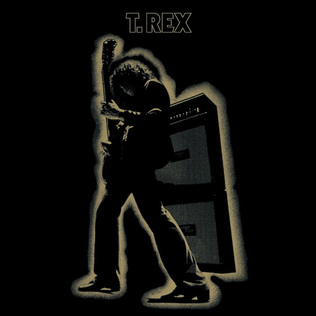
Electric Warrior is the second studio album by English rock band T. Rex and their sixth since their 1968 debut as Tyrannosaurus Rex, released on 24 September 1971. The album marked a turning point in the band's style, moving away from the folk-oriented sound of the group's previous albums and pioneering a more flamboyant, pop-oriented glam rock style.

The Slider is the seventh studio album by English rock band T. Rex, and the third since abbreviating their name from Tyrannosaurus Rex. It was released on 21 July 1972 by record labels EMI and Reprise. Two number-one singles, "Telegram Sam" and "Metal Guru", were released to promote the album. Issued at the height of the band's popularity, The Slider received acclaim from critics, reaching number 4 in the UK Albums Chart and number 17 in the US.

T. Rex is a 1970 album by Marc Bolan's band T. Rex, the first under that name and the fifth since their debut as Tyrannosaurus Rex in 1968. It was released on 18 December by record labels Fly and Reprise. The album continued the shift begun by its predecessor from the band's previous folk style to a minimal rock sound, with an even balance of electric and acoustic material.

Tanx is a 1973 album by rock band T. Rex, the eighth since their debut as Tyrannosaurus Rex in 1968, and the fourth under the moniker T. Rex. It was released on 16 March by record label EMI. Tanx was a musical departure from previous works: still containing tracks in the vein of The Slider, singer and songwriter Marc Bolan showed his interest for soul music, funk and gospel. Female backing singers appeared on a few tracks. New instruments such as mellotron were used, played by producer Tony Visconti, allowing the T. Rex sound to evolve.

"Get It On" is a song by the English rock band T. Rex, featured on their 1971 album Electric Warrior. Written by frontman Marc Bolan, "Get It On" was the second chart-topper for T. Rex on the UK Singles Chart. In the United States, it was retitled "Bang a Gong (Get It On)" to avoid confusion with a song of the same name by the group Chase.
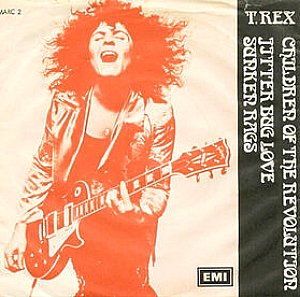
"Children of the Revolution" is a song by T. Rex, written by Marc Bolan. It was a UK No. 2 hit single in September 1972. The song broke their sequence of four official single releases all reaching No. 1 on the UK Singles Chart, although it did reach the summit position on the New Musical Express and Melody Maker charts, becoming the last T. Rex single to do so on any UK chart. It did not receive a regular album release.

"Telegram Sam" is a song written by Marc Bolan for the British rock group T. Rex, appearing on their 1972 album The Slider. The song was their third UK number one single, remaining at the top of the charts for two weeks.

"Jeepster" is a song by English glam rock band T. Rex. It was released on 5 November 1971 by record label Fly as a single from the group's sixth studio album Electric Warrior. The B-side, "Life's a Gas", is taken from the same album. Several artists have recorded cover versions of it. Both of the single's tracks were written by Marc Bolan and produced by Tony Visconti.

"20th Century Boy" is a song by T. Rex, written by Marc Bolan, released as a stand-alone single on 2 March 1973.

Dandy in the Underworld is the twelfth and final studio album by English rock band T. Rex. It was released on 11 March 1977 by record label EMI. It reached No. 26 in the UK charts, the band's highest-charting album since 1974's Zinc Alloy. The lead-off single "I Love to Boogie" had been a hit single in the UK the previous year, peaking at number 13 in the singles chart.

"Ride a White Swan" is a song by English band T. Rex. It was released as a stand-alone single on 9 October 1970 by record label Fly, and was the first single credited under the band's new, shorter name. Like all of the band's songs, it was written by the group's singer, guitarist and founder Marc Bolan. The song was included on the US version of the 1970 album, T. Rex.

Bolan's Zip Gun is the tenth studio album by English rock band T. Rex, released in February 1975 by record label EMI.
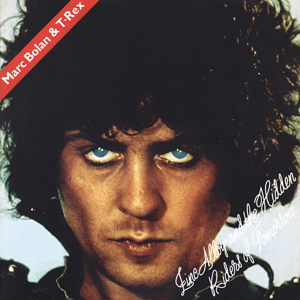
Zinc Alloy and the Hidden Riders of Tomorrow is an album by English rock band T. Rex, the ninth since Tyrannosaurus Rex's debut LP. It was released in March 1974 on the T.Rex record label, distributed by EMI. It was the first and only album to be released under the moniker "Marc Bolan & T. Rex".

T. Rex were an English rock band formed in London in 1967 by singer-songwriter and guitarist Marc Bolan, who was their leader, frontman and only consistent member. Though initially associated with the psychedelic folk genre, Bolan began to change the band's style towards electric rock in 1969, and shortened their name to T. Rex the following year. This development culminated in 1970 with their first significant hit single "Ride a White Swan", and the group soon became pioneers of the glam rock movement.

"Solid Gold Easy Action" is a song by T. Rex, written by Marc Bolan. It was released as a single on 1 December 1972 and reached No. 2 in the UK Singles Chart. The song did not feature on an original studio album but was included on the 1972 Great Hits compilation album issued by EMI Records, as well as most CD reissues of Tanx. It was beaten to No. 1 in the UK Singles Chart by "Long Haired Lover from Liverpool" by Little Jimmy Osmond.
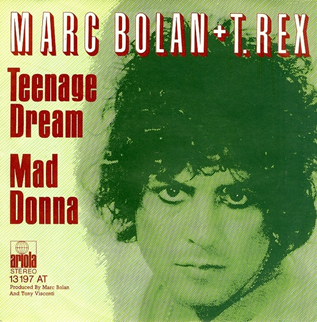
"Teenage Dream" is a 1974 single by Marc Bolan and T. Rex, appeared also on the album Zinc Alloy and the Hidden Riders of Tomorrow.
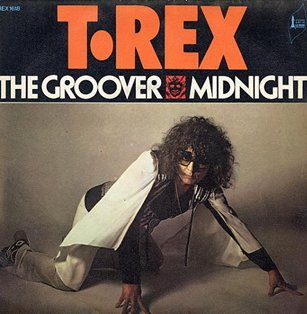
"The Groover" is a 1973 single by the British glam rock band T. Rex. Neither the track nor its B-side are taken from an album. However, they are often added as bonus material on re-releases of the 1974 album Zinc Alloy and the Hidden Riders of Tomorrow.

"The Soul of My Suit" is a song by English rock band T. Rex, which was released in 1977 as the second single from their twelfth and final studio album Dandy in the Underworld. The song was written and produced by Marc Bolan. "The Soul of My Suit" reached number 42 in the UK Singles Chart and remained in the top 50 for three weeks.
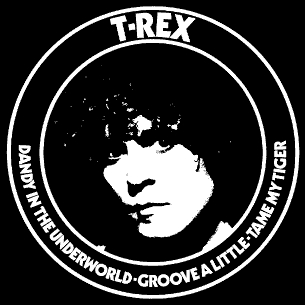
"Dandy in the Underworld" is a song by English rock band T. Rex, released by EMI on 27 May 1977 as the third single from their twelfth and final studio album Dandy in the Underworld. The song was written and produced by Marc Bolan.
